- Koirala, B., Rushton, S., Adhikary, P., Balen, J., et al. (2024) COVID-19 as a challenge to Nepal’s newly federalised health system: capacities, responsibilities, and mindsets, Asia Pacific Journal of Public Health (online first) https://doi.org/10.1177/1010539524125012.
- Sapkota, S., Rushton, S., van Teijlingen, E., et al. (2024) Participatory policy analysis in health policy and systems research: reflections from a study in Nepal. Health Research & Policy Systems, 22 (No.7) https://doi.org/10.1186/s12961-023-01092-5 .
- Wasti, S.P., van Teijlingen, E., Simkhada, P., et al. (2023) Selection of Study Sites and Participants for Research into Nepal’s Federal Health System, WHO South-East Asia Journal of Public Health 12(2):116-119.
- Sapkota, S., Dhakal, A., Rushton S., et al. (2023) The impact of decentralisation on health systems: a systematic review of reviews. BMJ Global Health 8:e013317. doi:10.1136/bmjgh-2023-013317.
- Wasti, S.P., van Teijlingen, E., Rushton, S., et al. (2023) Overcoming the Challenges Facing Nepal’s Health System During Federalisation: An Analysis of Health System Building Blocks, Health Research Policy & Systems 21(117) https://doi.org/10.1186/s12961-023-01033-2
- Sapkota, S., Panday, S., Wasti, S.P., et al. (2022) Health System Strengthening: The Role of Public Health in Federal Nepal, Journal of the Nepal Public Health Association 7(1):36-42.
- Adhikary, P., Balen, J., Gautam, S., et al. (2020) The COVID-19 pandemic in Nepal: Emerging evidence on the effectiveness of action by, and cooperation between, different levels of government in a federal system, Journal of Karnali Academy of Health Sciences 3 (3): 1-11.
- Rushton, S., Pandey, S., van Teijlingen, E., et al. (2021) An Investigation into the Impact of Decentralization on the Health System of Nepal. Journal of Manmohan Memorial Institute of Health Sciences, 7(1): 3–14. https://doi.org/10.3126/jmmihs.v7i1.43146
Tagged / Health systems
Impact of federalisation on Nepal’s health system
On Boxing Day and the following day (Dec. 27th) a member of our research team, Amshu Dhakal based at Manmohan Memorial Institute of Health Sciences (MMIHSS), presented findings from our Nepal Federal Health System Project in Kathmandu. The event, Nepal Health Conclave 2024, was organised by the Ministry of Health and Population and supported by WHO (World Health Organization) Nepal and UNFPA. The event aimed to help strengthen Nepal’s health services. This year’s conclave, themed “Bridging the Gap Between Global Expertise and National Needs”, brought together Nepalese diaspora health professionals and national stakeholders to foster collaboration and innovation in health systems.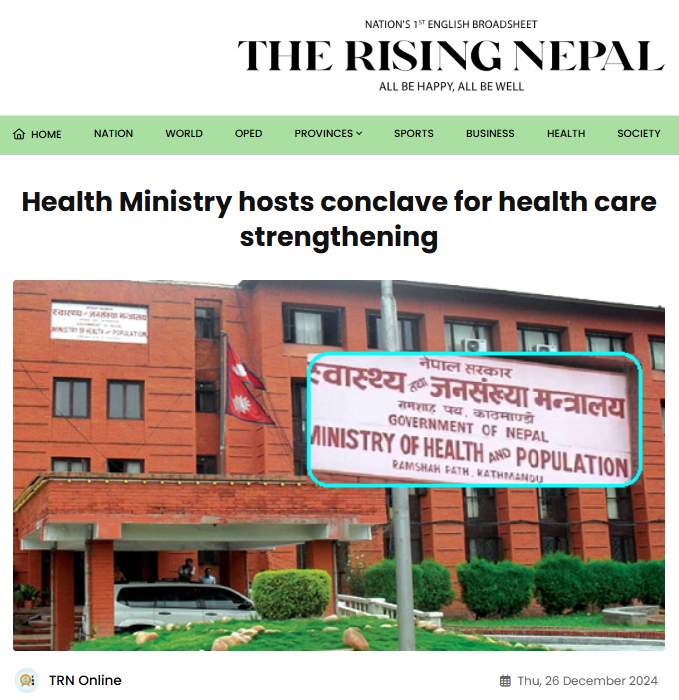
Amshu presented two posters at the event: (1) The Impact of Decentralisation on Health Systems: A Systematic Review of Reviews which systematically reviewed how decentralisation affects health systems globally, highlighting key opportunities and challenges across WHO’s six building blocks; and (2) Transforming the Health System in Nepal: The Impact of Federalisation, which examined how the transition to a federal system reshaped Nepal’s health system, identifying gaps, opportunities, and actionable recommendations for improvement.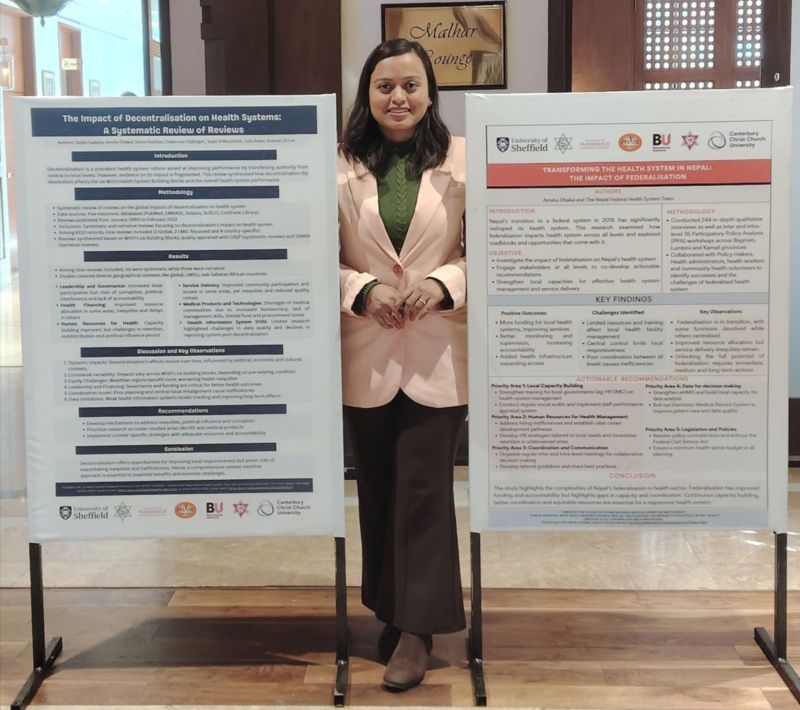
Our research team produced policy briefs in collaboration with government officials/stakeholders from all three levels of government. The policy briefs can be accessed at the website of our Nepal Federal Health System Project. This study was funded by the UK Health Systems Research Initiative [Grant ref. MR/T023554/1] to study the consequences for the health system of Nepal’s move from a centralised political system to a more federal government structure in 2015. This joint project was led by the University of Sheffield in collaboration with Bournemouth University, the University of Huddersfield, Canter Bury Christ Church University and two institutions in Nepal, namely MMIHS and PHASE Nepal.
In late 2022 further funding was awarded by the Medical Research Foundation to Prof. Julie Balen, from Canterbury Christ Church University, to disseminate the findings of our UK Health Systems Research Initiative-funded research in Nepal. In terms of academic dissemination, we have published eight papers from this interdisciplinary project [1-8].
Prof. Edwin van Teijlingen
Centre for Midwifery & Women’s Health
References:
- Koirala, B., Rushton, S., Adhikary, P., Balen, J., et al. (2024) COVID-19 as a challenge to Nepal’s newly federalised health system: capacities, responsibilities, and mindsets, Asia Pacific Journal of Public Health (online first) https://doi.org/10.1177/1010539524125012.
- Sapkota, S., Rushton, S., van Teijlingen, E., et al. (2024) Participatory policy analysis in health policy and systems research: reflections from a study in Nepal. Health Research & Policy Systems, 22 (No.7) https://doi.org/10.1186/s12961-023-01092-5 .
- Wasti, S.P., van Teijlingen, E., Simkhada, P., et al. (2023) Selection of Study Sites and Participants for Research into Nepal’s Federal Health System, WHO South-East Asia Journal of Public Health 12(2):116-119.
- Sapkota, S., Dhakal, A., Rushton S., et al. (2023) The impact of decentralisation on health systems: a systematic review of reviews. BMJ Global Health 8:e013317. doi:10.1136/bmjgh-2023-013317.
- Wasti, S.P., van Teijlingen, E., Rushton, S., et al. (2023) Overcoming the Challenges Facing Nepal’s Health System During Federalisation: An Analysis of Health System Building Blocks, Health Research Policy & Systems 21(117) https://doi.org/10.1186/s12961-023-01033-2
- Sapkota, S., Panday, S., Wasti, S.P., et al. (2022) Health System Strengthening: The Role of Public Health in Federal Nepal, Journal of the Nepal Public Health Association 7(1):36-42.
- Adhikary, P., Balen, J., Gautam, S., et al. (2020) The COVID-19 pandemic in Nepal: Emerging evidence on the effectiveness of action by, and cooperation between, different levels of government in a federal system, Journal of Karnali Academy of Health Sciences 3 (3): 1-11.
- Rushton, S., Pandey, S., van Teijlingen, E., et al. (2021) An Investigation into the Impact of Decentralization on the Health System of Nepal. Journal of Manmohan Memorial Institute of Health Sciences, 7(1): 3–14. https://doi.org/10.3126/jmmihs.v7i1.43146
BMJ Global Health Blog online
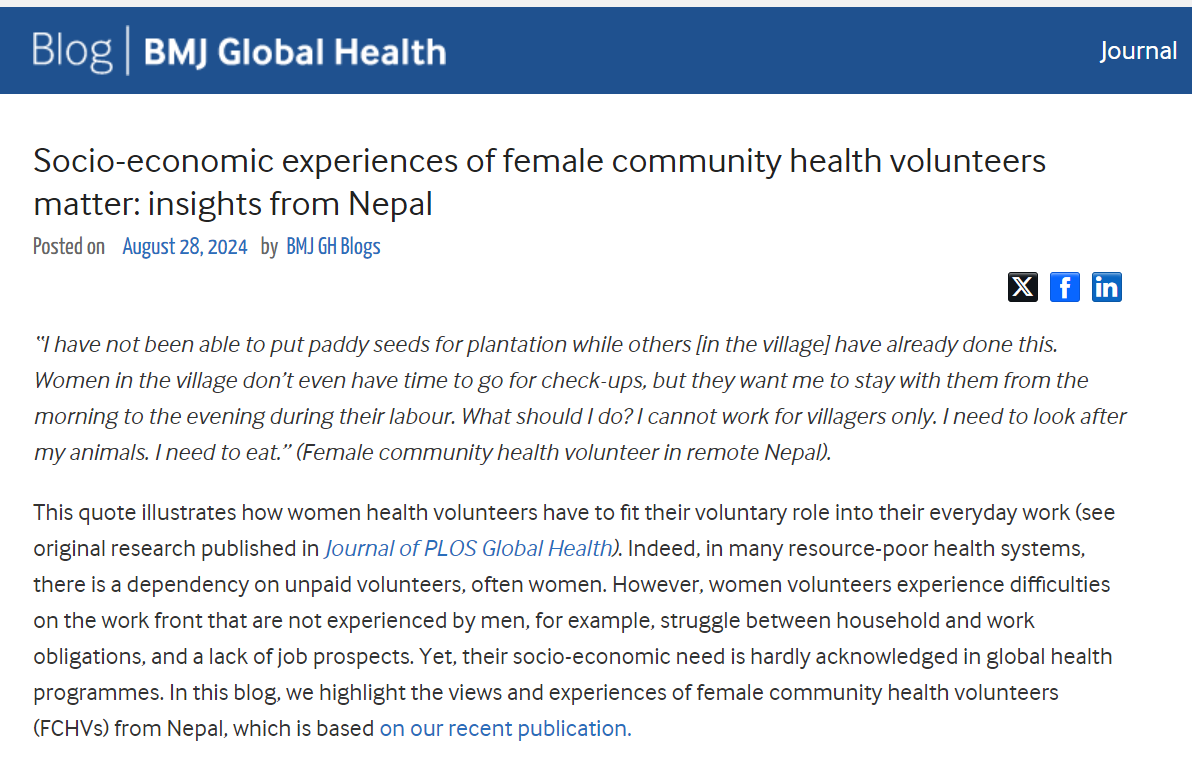 Today BMJ Global Health posted a blog (read it here!) about our recently publish paper ‘Socio-economic experiences of female community health volunteers matter: insights from Nepal’ which appeared last month in the Open Access journal PLOS Global Public Health [1]. In Nepal, about 50,000 Female Community Health Volunteers (FCHVs) are a vital human resource for both government and non-government agencies delivering primary healthcare at community level. Their contribution to maternal and child health is recognised globally. Being an active volunteer brought some interesting issues for the FCHCs. For example, the social experience of working in one’s own village was not the same for all. While community recognition of volunteers’ work was seen as a motivator, most volunteers thought they were not given due respect by fellow community members. Too often community members mistook volunteers as paid health workers often due to their involvement in medicine distribution, a rare bi-annual activity.
Today BMJ Global Health posted a blog (read it here!) about our recently publish paper ‘Socio-economic experiences of female community health volunteers matter: insights from Nepal’ which appeared last month in the Open Access journal PLOS Global Public Health [1]. In Nepal, about 50,000 Female Community Health Volunteers (FCHVs) are a vital human resource for both government and non-government agencies delivering primary healthcare at community level. Their contribution to maternal and child health is recognised globally. Being an active volunteer brought some interesting issues for the FCHCs. For example, the social experience of working in one’s own village was not the same for all. While community recognition of volunteers’ work was seen as a motivator, most volunteers thought they were not given due respect by fellow community members. Too often community members mistook volunteers as paid health workers often due to their involvement in medicine distribution, a rare bi-annual activity. 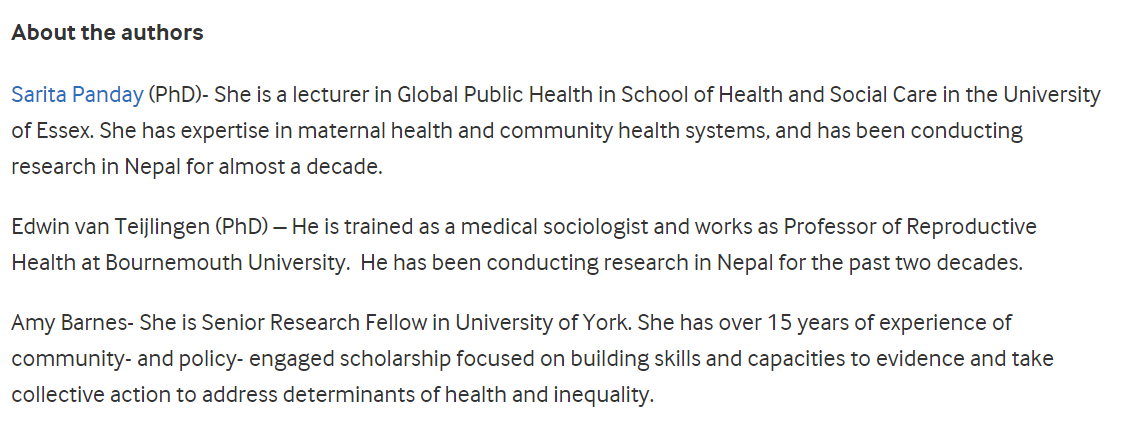
Our recent paper in BMJ Global Health was highlighted in an earlier BU Research Blog (to read this click here!). This latest paper is the third one based on Dr. Sarita Panday’s PhD research conducted at the University of Sheffield [2-3]. It is the fourth Bournemouth University paper on FCHVs with last weeks publication in the Journal of Manmohan memorial Institute of Health Sciences [4]
Professor Edwin van Teijlingen

References:
- Panday, S., Barnes, A., van Teijlingen, E. (2024) Exploring the motivations of female community health volunteers in primary healthcare provision in rural Nepal: a qualitative study, PLOS Global Public Health 4(8): e0003428
- Panday, S., Bissell, P., van Teijlingen, E., Simkhada, P. (2017) The contribution of female community health volunteers (FCHVs) to maternity care in Nepal: a qualitative study, BMC Health Services Research 17:623 be/vz9C
- Panday, S., Bissell, P., van Teijlingen, E., Simkhada, P. (2019) Perceived barriers to accessing female community health volunteers’ services amongst ethnic minority women in Nepal: a qualitative study, PLoS ONE 14(6): e0217070 https://journals.plos.org/plosone/article?id=10.1371/journal.pone.0217070
- Bhattarai, S., van Teijlingen, E. (2024). Nepal Needs A Two-Pronged Approach to Secure Future of Its Female Community Health Volunteers (FCHVs). Journal of Manmohan Memorial Institute of Health Sciences, 9(1), 43–48. https://doi.org/10.3126/jmmihs.v9i1.68640
BU e-health paper read 4,000 times
Our paper ‘Midwives’ views towards women using mHealth and eHealth to self-monitor their pregnancy: A systematic review of the literature’ [1] reached 4,000 reads on ResearchGate today. Obviously, there is a growing interest in the use of mobile apps as well as the more general application of mHealth and eHealth in the UK and elsewhere.

Prof. Edwin van Teijlingen
Centre for Midwifery & Women’s Health

Reference:
- Vickery, M., van Teijlingen, E., Hundley, V., Smith, G. B., Way, S., Westwood, G. (2020). Midwives’ views towards women using mHealth and eHealth to self-monitor their pregnancy: A systematic review of the literature. European Journal of Midwifery, 4: 1-11. https://doi.org/10.18332/ejm/126625
New COVID-19 publication
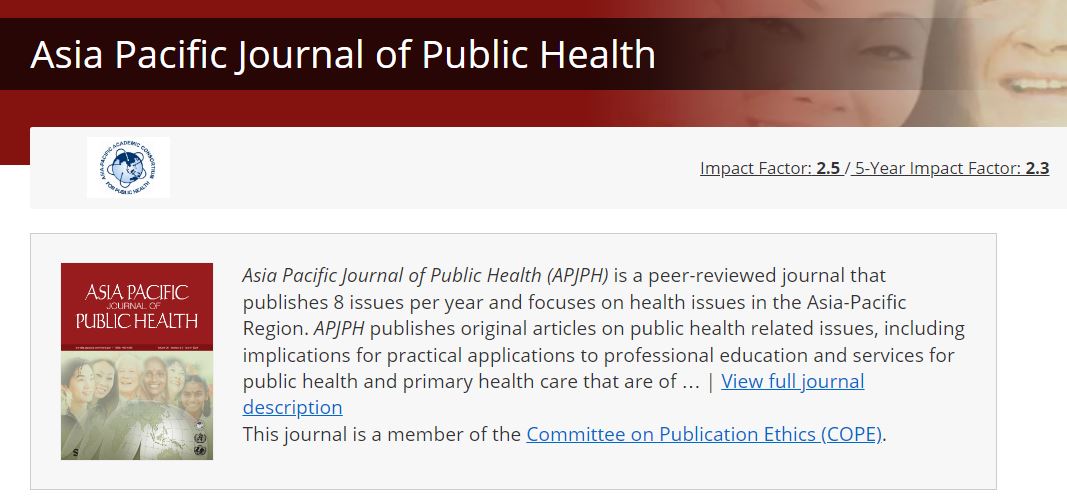 This week the Asia Pacific Journal of Public Health (APJPH) accepted our latest paper from our research on the impact of the federalisation of the health care system in Nepal. This paper ‘COVID-19 as a challenge to Nepal’s newly federalised health system: capacities, responsibilities, and mindsets’ has Bikesh Koirala as first author [1].
This week the Asia Pacific Journal of Public Health (APJPH) accepted our latest paper from our research on the impact of the federalisation of the health care system in Nepal. This paper ‘COVID-19 as a challenge to Nepal’s newly federalised health system: capacities, responsibilities, and mindsets’ has Bikesh Koirala as first author [1].
This recently completed study was funded by the UK Health Systems Research Initiative [Grant ref. MR/T023554/1]. In this larger Nepal Federal Health System Project we studied the effects on the health system of Nepal’s move from a centralised political system to a more federal government structure in 2015. This joint project was led by the University of Sheffield in collaboration with Bournemouth University, the University of Huddersfield, Canterbury Christ Church University and two higher education institutions in Nepal: MMIHS (Manmohan Memorial Institute of Health Sciences) and PHASE Nepal.
This is the seventh paper from our collaboration. Previous papers focused on a wide range of aspects of this interdisciplinary study, including on its methods, participatory policy analysis, the WHO (World Health Organization) health systems building blocks, and public health [2-7].
Prof. Edwin van Teijlingen
CMWH (Centre for Midwifery & Women’s Health)
References:
- Koirala, B., Rushton, S., Adhikary, P., Balen, J., Basnet, S., Joshi, S., Karki, A., Lee, A., Rijal, B., Simkhada, P., Subedi, M., van Teijlingen, E., Karki, J. (2024) COVID-19 as a challenge to Nepal’s newly federalised health system: capacities, responsibilities, and mindsets, Asia Pacific Journal of Public Health (accepted).
- Sapkota, S., Rushton, S., et al. (2024) Participatory policy analysis in health policy and systems research: reflections from a study in Nepal. Health Research & Policy Systems, 22 (No.7) https://doi.org/10.1186/s12961-023-01092-5 .
- Wasti, S.P., van Teijlingen, E., et al. (2023) Overcoming the Challenges Facing Nepal’s Health System During Federalisation: An Analysis of Health System Building Blocks, Health Research Policy & Systems 21(117) https://doi.org/10.1186/s12961-023-01033-2
- Sapkota, S., Dhakal, A., et al. (2023) The impact of decentralisation on health systems: a systematic review of reviews. BMJ Global Health 8:e013317. doi:10.1136/bmjgh-2023-013317.
- Sapkota, S., Panday, S., et al. (2022) Health System Strengthening: The Role of Public Health in Federal Nepal, Journal of the Nepal Public Health Association 7(1):36-42.
- Adhikary, P., Balen, J., et al. (2020) The COVID-19 pandemic in Nepal: Emerging evidence on the effectiveness of action by, and cooperation between, different levels of government in a federal system, Journal of Karnali Academy of Health Sciences 3 (3): 1-11.
- Rushton, S., Pandey, S., van Teijlingen, E., et al. (2021) An Investigation into the Impact of Decentralization on the Health System of Nepal. Journal of Manmohan Memorial Institute of Health Sciences, 7(1): 3–14. https://doi.org/10.3126/jmmihs.v7i1.43146
Latest paper from Federalisation & Health System in Nepal
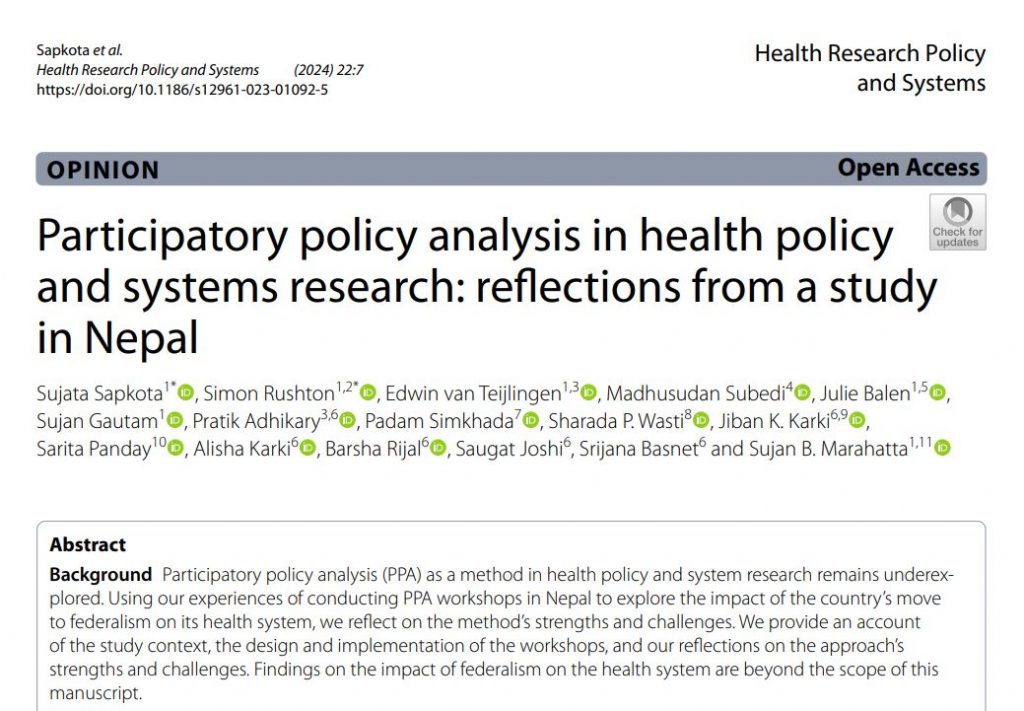 The sixth paper from our interdisciplinary research team focuses on the effective way we applied participatory policy analysis in a study on the effects on the health system in Nepal. In the research we used a methodological approach using the River of Life which we describe in this paper ‘Participatory policy analysis in health policy and systems research: reflections from a study in Nepal’ [1]. The Lead author is Dr. Sujata Sapkota from Manmohan Memorial Institute of Health Sciences (MMIHS) in Kathmandu.
The sixth paper from our interdisciplinary research team focuses on the effective way we applied participatory policy analysis in a study on the effects on the health system in Nepal. In the research we used a methodological approach using the River of Life which we describe in this paper ‘Participatory policy analysis in health policy and systems research: reflections from a study in Nepal’ [1]. The Lead author is Dr. Sujata Sapkota from Manmohan Memorial Institute of Health Sciences (MMIHS) in Kathmandu.
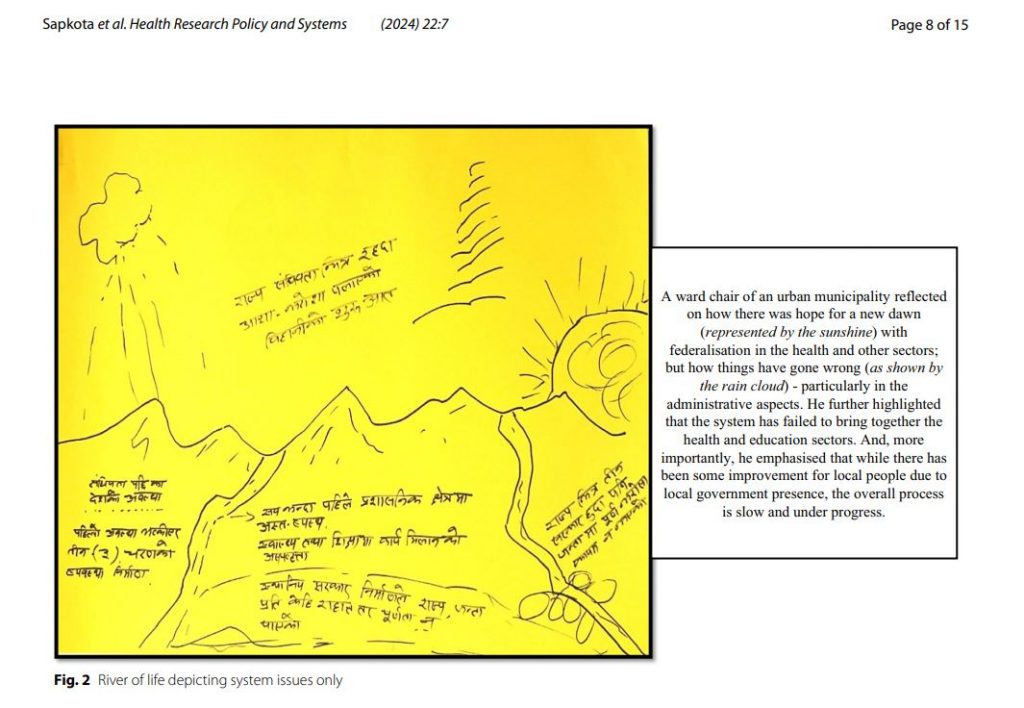 This study was funded by the UK Health Systems Research Initiative [Grant ref. MR/T023554/1]. In this larger Nepal Federal Health System Project we study the consequences for the health system of Nepal’s move from a centralised political system to a more federal government structure in 2015. This joint project is led by the University of Sheffield in collaboration with Bournemouth University, the University of Huddersfield, Canter Bury Christ Church University and two institutions in Nepal, namely MMIHS and PHASE Nepal. We have managed to publish five papers from this project prior to today’s one reflecting on the methodology [2-6].
This study was funded by the UK Health Systems Research Initiative [Grant ref. MR/T023554/1]. In this larger Nepal Federal Health System Project we study the consequences for the health system of Nepal’s move from a centralised political system to a more federal government structure in 2015. This joint project is led by the University of Sheffield in collaboration with Bournemouth University, the University of Huddersfield, Canter Bury Christ Church University and two institutions in Nepal, namely MMIHS and PHASE Nepal. We have managed to publish five papers from this project prior to today’s one reflecting on the methodology [2-6].
Prof. Edwin van Teijlingen
CMWH (Centre for Midwifery & Women’s Health)
References:
- Sapkota, S., Rushton, S., van Teijlingen, E., Subedi, M., Balen, J., Gautam, S., Adhikary, P., Simkhada, P., Wasti, S.P., Karki, J.K., Panday, S., Karki, A., Rijal, B., Joshi, S., Basnet, S., Marahatta, S.B. (2024) Participatory policy analysis in health policy and systems research: reflections from a study in Nepal. Health Research & Policy Systems, 22 (No.7) https://doi.org/10.1186/s12961-023-01092-5 .
- Wasti, S.P., van Teijlingen, E., Rushton, S., et al. (2023) Overcoming the Challenges Facing Nepal’s Health System During Federalisation: An Analysis of Health System Building Blocks, Health Research Policy & Systems 21(117) https://doi.org/10.1186/s12961-023-01033-2
- Sapkota, S., Dhakal, A., Rushton S., et al. (2023) The impact of decentralisation on health systems: a systematic review of reviews. BMJ Global Health 8:e013317. doi:10.1136/bmjgh-2023-013317.
- Sapkota, S., Panday, S., Wasti, S.P., et al. (2022) Health System Strengthening: The Role of Public Health in Federal Nepal, Journal of the Nepal Public Health Association 7(1):36-42.
- Adhikary, P., Balen, J., Gautam, S., et al. (2020) The COVID-19 pandemic in Nepal: Emerging evidence on the effectiveness of action by, and cooperation between, different levels of government in a federal system, Journal of Karnali Academy of Health Sciences 3 (3): 1-11.
- Rushton, S., Pandey, S., van Teijlingen, E., et al. (2021) An Investigation into the Impact of Decentralization on the Health System of Nepal. Journal of Manmohan Memorial Institute of Health Sciences, 7(1): 3–14. https://doi.org/10.3126/jmmihs.v7i1.43146
BU Workshop on Health Systems in Nepal
You are invited to a two-hour ‘Workshop on Health Systems in Nepal’ at Bournemouth University (BU) on Thursday 25th May in the Bournemouth Gateway Building (BGB room 315) starting at 14.00, aiming to finish at 16.00. We have the pleasure of welcoming three academic visitors from Manmohan Memorial Institute of Health Sciences (MMIHS) in Kathmandu who are at BU on an Erasmus+ exchange.
‘Prof. Sujan Marahatta, Dr. Sujata Sapkota and Dr. Sujan Gautam from MMIHS are part of an international project examining the consequences for the health system of Nepal’s move to a federal government structure. This project, launched in 2020 at the beginning of the COVID-19 pandemic, is led by the University of Sheffield, in collaboration with BU, the University of Huddersfield, PHASE Nepal and MMIHS. This nearly four-year project is UK-funded by the MRC (Medical Research Council), the Wellcome Trust and DFID (now called Foreign, Commonwealth & Development Office [FCDO]) under the Health Systems Research Initiative.
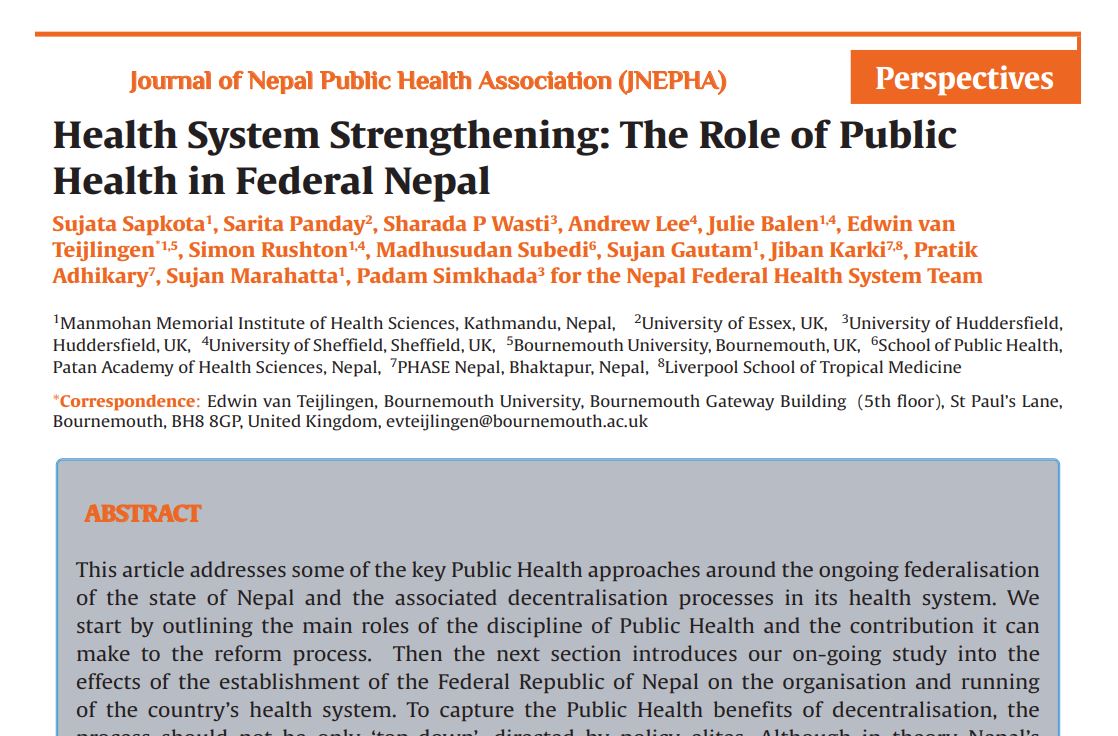 The project has resulted in several publications, all in Open Access journals. The first of three papers introduced the research project ‘The impact of federalisation on Nepal’s health system: a longitudinal analysis’ [1], the second focused on COVID-19 when examining the effects of changing Nepal’s constitution towards a federal republic on its health system [2], and the third one highlighted Public Health approaches around the ongoing federalisation of the state of Nepal and the associated decentralisation processes in its health system [3].
The project has resulted in several publications, all in Open Access journals. The first of three papers introduced the research project ‘The impact of federalisation on Nepal’s health system: a longitudinal analysis’ [1], the second focused on COVID-19 when examining the effects of changing Nepal’s constitution towards a federal republic on its health system [2], and the third one highlighted Public Health approaches around the ongoing federalisation of the state of Nepal and the associated decentralisation processes in its health system [3].
Prof. Edwin van Teijlingen
Centre for Midwifery & Women’s Health (formerly CMMPH)
References:
- Sapkota, S., Panday, S., Wasti, S.P., Lee, A., Balen, J., van Teijlingen, E., Rushton, S., Subedi, M., Gautam, S., Karki, J., Adhikary, P., Marahatta, S., Simkhada, P. for the Nepal Federal Health System Team (2022) Health System Strengthening: The Role of Public Health in Federal Nepal, Journal of Nepal Public Health Association 7 (1): 36-42.
- Rushton, S., Pandey, S., van Teijlingen, E., Subedi, M., Balen, J., Karki, J., Simkhada, P. on behalf of the Nepal Federal Health System Team (2021) An Investigation into the Impact of Decentralization on the Health System of Nepal. Journal of Manmohan Memorial Institute of Health Sciences, 7(1): 3–14. https://doi.org/10.3126/jmmihs.v7i1.43146
- Adhikary, P., Balen, J., Gautam, S., Ghimire S., Karki J.K., Lee A.C., Marahatta S.B., Pandey S., Pohl G., Ruston S., Sapkota S., Simkhada P.P., Subedi M., van Teijlingen E.R., on behalf of the NFHS Team (2020) The COVID-19 pandemic in Nepal: Emerging evidence on the effectiveness of action by, and cooperation between, different levels of government in a federal system. Journal of Karnali Academy of Health Sciences 3(3)
PhD paper on health management in pre-Taliban Afghanistan
 Yesterday FHSS graduate Dr. Shaqaieq Ashrafi Dost heard from Razi International Medical Journal the the paper from her Ph.D. study had been accepted for publication. Her paper ‘Management capacity in the Ministry of Public Health (MoPH) Afghanistan: Political and socio-cultural issues’ is based on a mixed-methods case-study was conducted with staff at the Afghan Ministry of Public Health. The Ph.D. study explores MoPH’s management capacity. Interviews were conducted with 12 senior staff and qualitative data were analysed thematically. A quantitative survey, covering directors of 30 departments, was analysed using descriptive statistics.
Yesterday FHSS graduate Dr. Shaqaieq Ashrafi Dost heard from Razi International Medical Journal the the paper from her Ph.D. study had been accepted for publication. Her paper ‘Management capacity in the Ministry of Public Health (MoPH) Afghanistan: Political and socio-cultural issues’ is based on a mixed-methods case-study was conducted with staff at the Afghan Ministry of Public Health. The Ph.D. study explores MoPH’s management capacity. Interviews were conducted with 12 senior staff and qualitative data were analysed thematically. A quantitative survey, covering directors of 30 departments, was analysed using descriptive statistics.
The paper reports that management capacity was generally weak. Key appointments including directors were subject to political interference and many directors appointed by politicians lacked the skills to manage well. Consequently, those directors were not able to support employees appropriately or to create a healthy work environment. The respondents reported that there were strong socio-cultural influences such as nepotism and favouritism. Often employees believed they were not treated consistently or fairly. This was compounded by overly complex administrative systems. The authors concluded that the Afghan government needs to appoint competent and committed staff who can recognize/address the gaps in the functioning of the Ministry, especially the negative political and socio-cultural practices that undermine effectiveness.The reader needs to bear in mind that this Ph.D. study was conducted prior to the 2021 takeover by the Taliban. Putting the paper’s conclusion in perspective.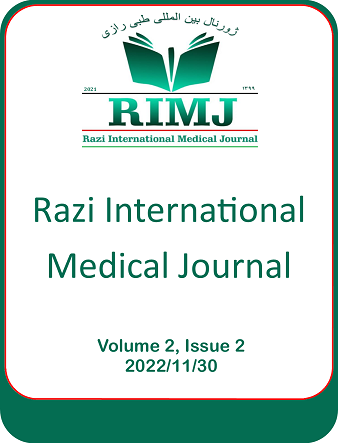
Razi International Medical Journal founded in 2021 is a peer-reviewed scholarly journal from Afghanistan that aims to impact public health and global health and distributed internationally. The journal is Open Access and published in electronic and paper-based format twice a year, and there is no article publishing charge (APCs).
Extensive media coverage in Nepal last week
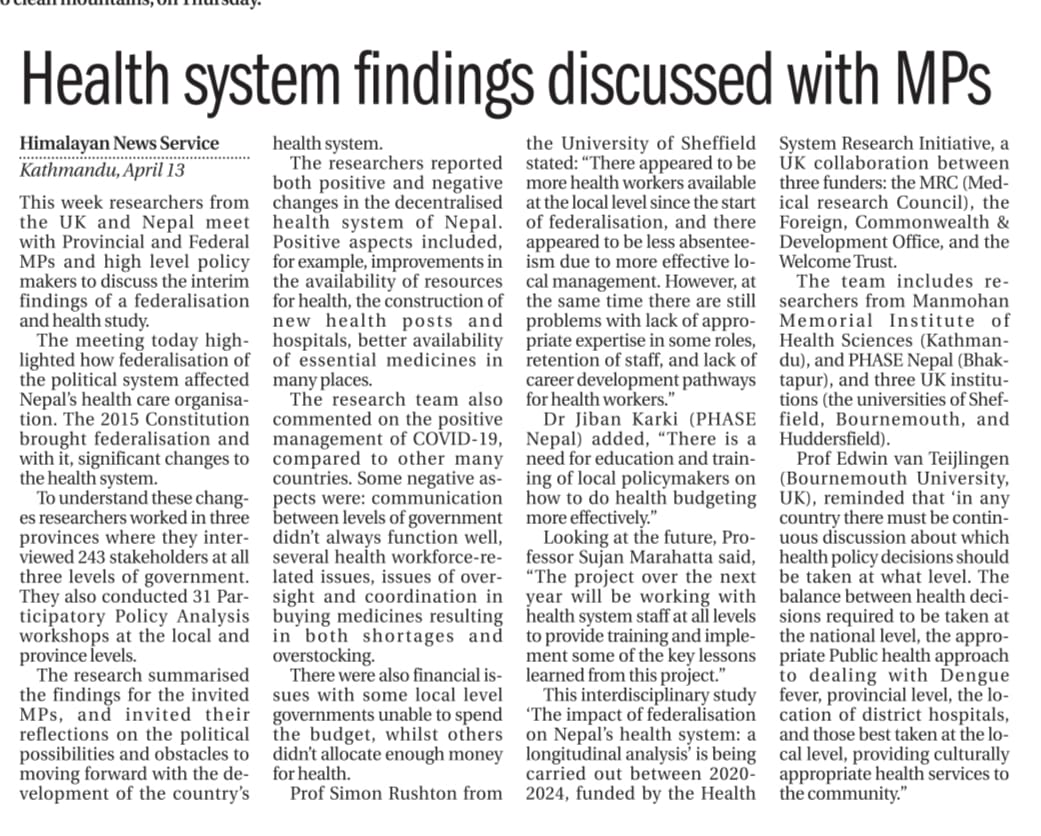 The interdisciplinary research project ‘The impact of federalisation on Nepal’s health system: a longitudinal analysis’ was reported in several national media in Nepal last week. This project running from 2020 to 2024 is, funded by the Health System Research Initiative, a UK collaboration between three funders: the MRC (Medical research Council), the Foreign, Commonwealth & Development Office, and the Welcome Trust.
The interdisciplinary research project ‘The impact of federalisation on Nepal’s health system: a longitudinal analysis’ was reported in several national media in Nepal last week. This project running from 2020 to 2024 is, funded by the Health System Research Initiative, a UK collaboration between three funders: the MRC (Medical research Council), the Foreign, Commonwealth & Development Office, and the Welcome Trust.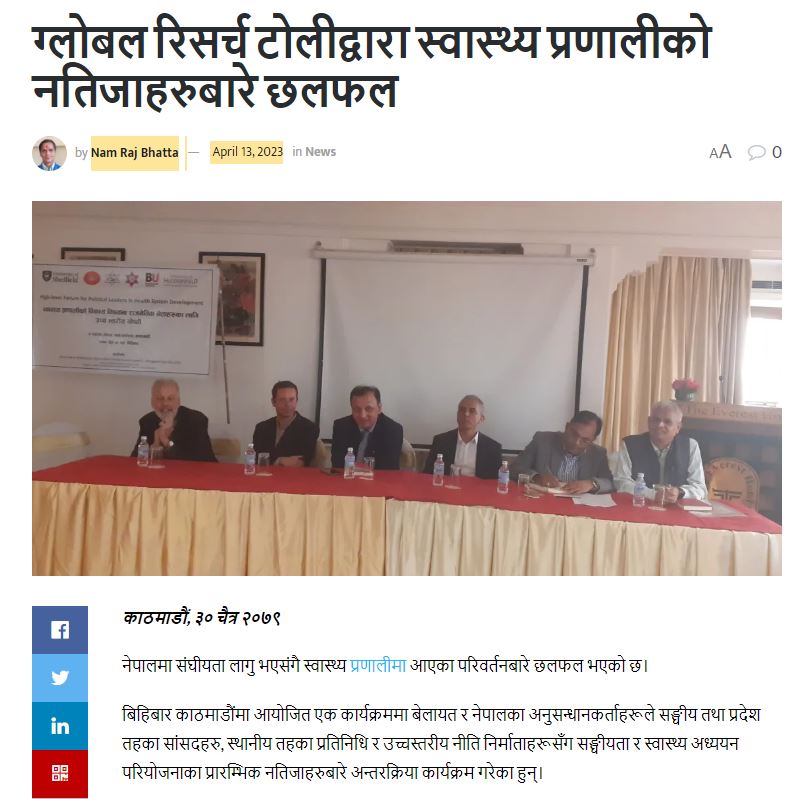
The 2015 Constitution brought federalisation and with it, significant changes to the health system. 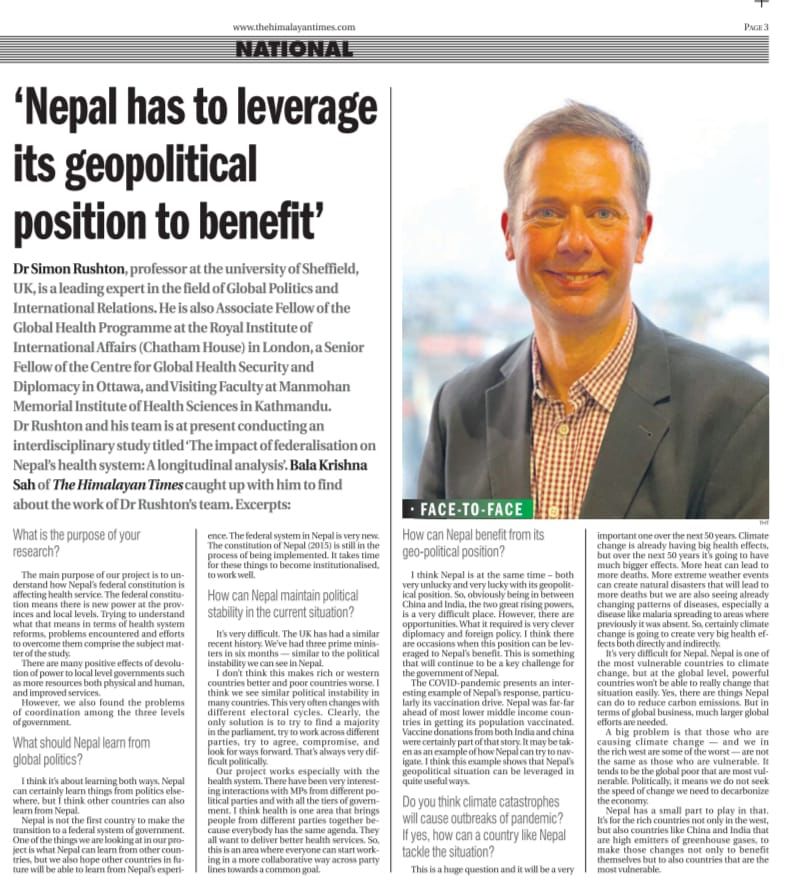 To understand these changes researchers worked in three provinces where they interviewed 243 stakeholders, at all three levels of government. They also conducted 31 Participatory Policy Analysis workshops at local and province levels. The team includes researchers from Manmohan Memorial Institute of Health Sciences (Kathmandu), and PHASE Nepal (Bhaktapur), and three UK institutions (the Universities of Sheffield, Bournemouth, and Huddersfield). It researchers from the UK and Nepal meet with Provincial and Federal MPs to discuss the interim findings of a federalisation and health study.
To understand these changes researchers worked in three provinces where they interviewed 243 stakeholders, at all three levels of government. They also conducted 31 Participatory Policy Analysis workshops at local and province levels. The team includes researchers from Manmohan Memorial Institute of Health Sciences (Kathmandu), and PHASE Nepal (Bhaktapur), and three UK institutions (the Universities of Sheffield, Bournemouth, and Huddersfield). It researchers from the UK and Nepal meet with Provincial and Federal MPs to discuss the interim findings of a federalisation and health study.
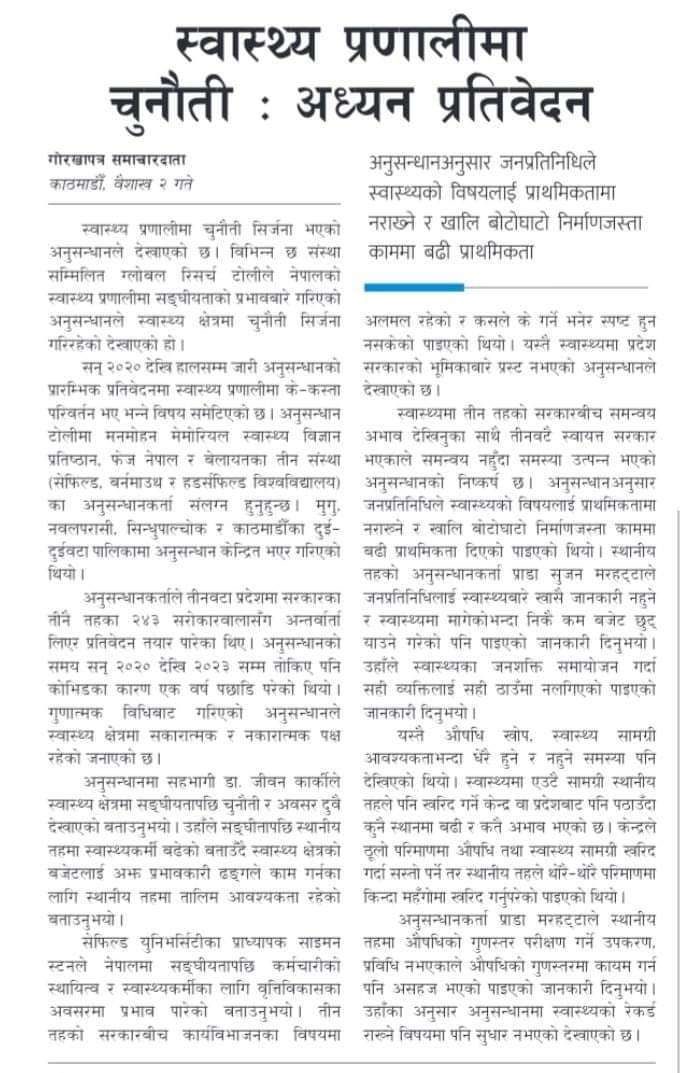
News articles appeared in national newspapers in Nepal, both in English and Nepali. The Nepali article appeared in the country’s oldest newspaper Gorkhapali, see copy here! Bournemouth University [Thank you Nathaniel Hobby and Stephen Bates] also publicized our press release on this project online. The journalist Nam Raj Bhatta published an item in the online Nepali-language newspaper NepalHealthOnline on April 13. The main meeting to discuss the interim findings of our project took place on Thursday 13 April an hotel close Nepal’s parliament. The interim results highlight how federalisation of the political system has affected Nepal’s health care organisation. The research team summarized the findings for the invited MPs and local and provincial political leaders, and invited their reflections on the political possibilities and obstacles to moving forward with the development of the country’s health system. The Himalayan Times published the article on top of this BU Research Blog as well as the special interview with the University of Sheffield based PI Prof. Simon Rushton.
Prof. Edwin van Teijlingen
Centre for Midwifery, Maternal & Perinatal Health
Conference presence in Nepal
Our study on the impact of federalism on the health system in Nepal got great coverage at the ‘Ninth National Summit of Health and Population Scientists in Nepal’ on Tuesday 11th April. This annual conference in Kathmandu is organised by the NHRC (Nepal Health Research Council).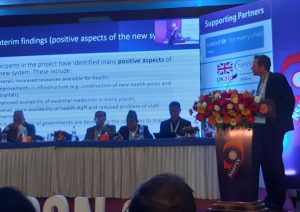
In the morning Prof. Sujan Marahatta (who is Visiting Professor at Bournemouth University) and Prof. Simon Rushton from the University of Sheffield presented in the plenary session. They jointly outlined the preliminary study findings. In the afternoon, our collaborator Dr. Jiban Karki (Liverpool School of Tropical Medicine) presented more detailed findings on ‘Human resource management at local level in Nepal’s federalised health system’ from the same study. 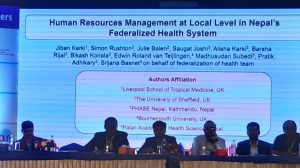
During the whole day we also had a poster presentation on display under the title ‘COVID-19 as a challenge to Nepal’s newly-federalised health system: Capacities, responsibilities, and mindsets’.
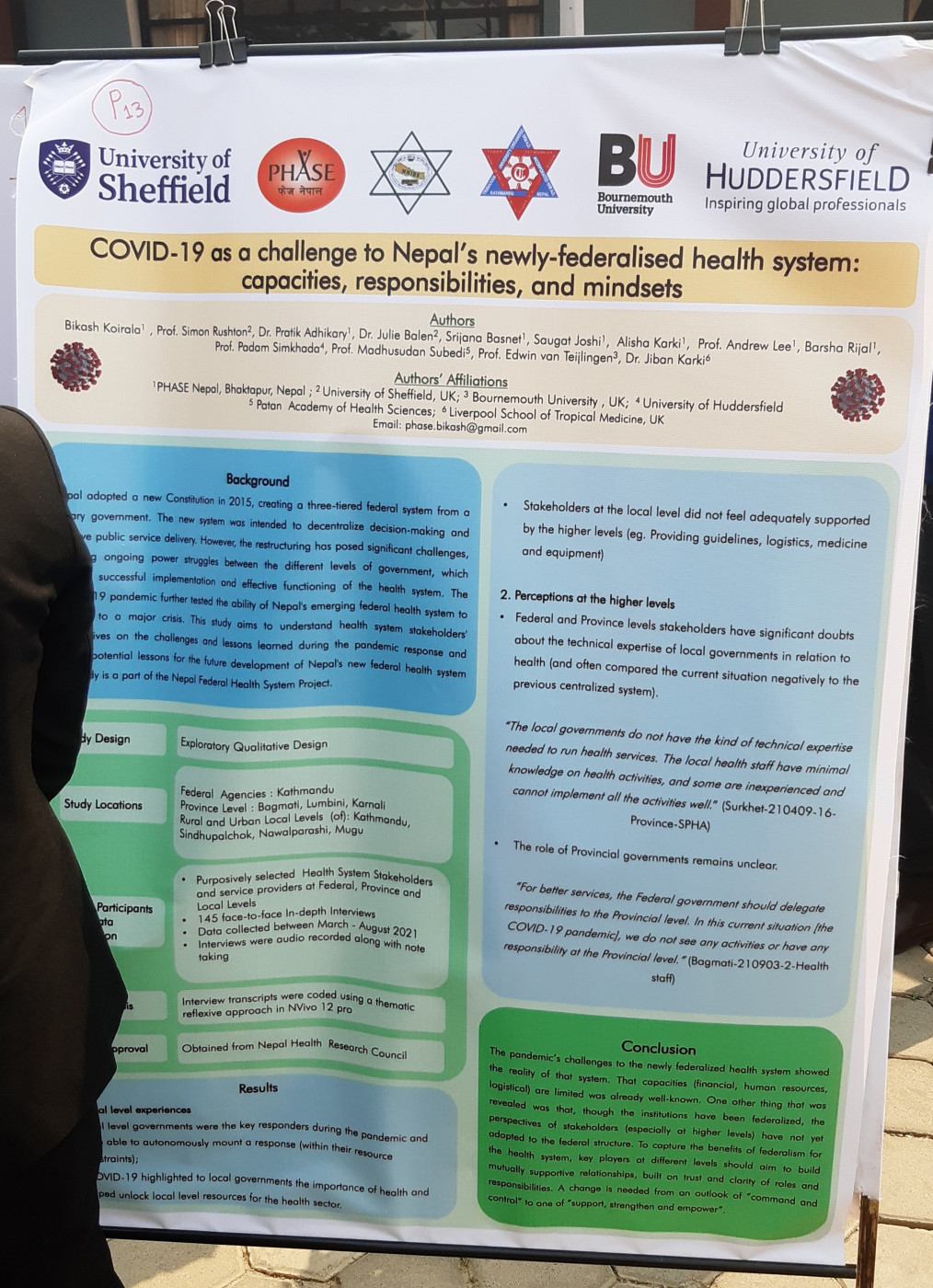 All dissemination was part of the Nepal Federal Health System Project, our major collaborative project examining the consequences for the health system of Nepal’s move to a federal government structure in 2015. This is a joint project (2020-2024) led by the University of Sheffield and collaborating with Bournemouth University, the University of Huddersfield, Manmohan Memorial Institute of Health Sciences (MMIHS) and PHASE Nepal. This longitudinal interdisciplinary study is funded by the UK Health Systems Research Initiative [Grant ref. MR/T023554/1].
All dissemination was part of the Nepal Federal Health System Project, our major collaborative project examining the consequences for the health system of Nepal’s move to a federal government structure in 2015. This is a joint project (2020-2024) led by the University of Sheffield and collaborating with Bournemouth University, the University of Huddersfield, Manmohan Memorial Institute of Health Sciences (MMIHS) and PHASE Nepal. This longitudinal interdisciplinary study is funded by the UK Health Systems Research Initiative [Grant ref. MR/T023554/1].
Prof. Edwin van Teijlingen
Centre for Midwifery, Maternal & Perinatal Health (CMMPH)
New paper Dr. Rachel Arnold
Congratulations to Dr. Rachel Arnold on the publication of her fourth PhD paper. Today the Journal of Asian Midwives informed us that the paper ‘Hidden Relationships: Perspectives on Leadership and Management in Afghan Maternity Services – An Ethnographic Exploration‘ has been published today [1]. Earlier papers have been published in BJOG, Social Science & Medicine as well as BMC Pregnancy & Childbirth [2-4]. The paper discusses the improvement of the quality of healthcare, particularly in low-income countries, which often focuses on the performance of healthcare providers and the availability, acceptability, and uptake of services. The role that health service leaders play in facilitating effective care has received less attention in the literature. This ethnographic study explored the perspectives of Afghan maternity care providers, managers and other stakeholders on leadership and the provision of quality maternity care.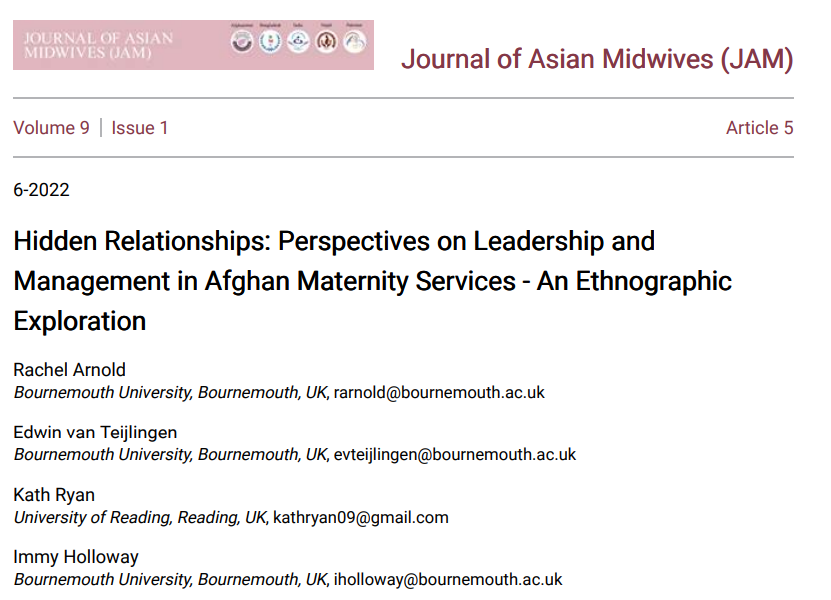
The results of this study involves 1. Healthcare providers who described their managers as both autocratic and weak. They explained that their managers failed to enforce standards or listen to their concerns. 2. Managers who felt powerless to improve
care because the government did not support their initiatives to reform the working environment or discipline staff members who were flouting the rules.

Prof. Edwin van Teijlingen
CMMPH
References:
- Arnold, R, vanTeijlingen, E, Ryan, K, & Holloway, I. (2022) Hidden Relationships: Perspectives on Leadership and Management in Afghan Maternity Services – An Ethnographic Exploration. Journal of Asian Midwives. 9(1):45–55.
- Arnold, R., van Teijlingen, E., Ryan, K., Holloway, I. (2019) Villains or victims? An ethnography of Afghan maternity staff and the challenge of high quality respectful care, BMC Pregnancy & Childbirth 19 :307 https://rdcu.be/bPqlj
- Arnold R., van Teijlingen E, Ryan K., Holloway I. (2015) Understanding Afghan health care providers: Qualitative study of culture of care in Kabul maternity hospital, BJOG 122: 260-267.
- Arnold, R., van Teijlingen, E., Ryan, K., Holloway, I. (2018) Parallel worlds: an ethnography of care in an Afghan maternity hospital, Social Science & Medicine 126:33-40.
New paper on federalisation of health system in Nepal
Earlier this week the editor of the Journal of Nepal Public Health Association informed us the journal had accepted our latest paper ‘Health System Strengthening: The Role of Public Health in Federal Nepal’ [1]. This article addresses some of the key Public Health approaches around the ongoing federalisation of the state of Nepal and the associated decentralisation processes in its health system. This is the third paper of our three-year project, which is UK-funded by the MRC, Wellcome Trust and DFID under the Health Systems Research Initiative and led by Dr. Julie Balen and Prof. Simon Rushton based at the University of Sheffield. The first two papers introduced our international research project ‘The impact of federalisation on Nepal’s health system: a longitudinal analysis’ [2], and focused on COVID-19 when examining the effects of changing Nepal’s constitution towards a federal republic on its health system [3].

Prof. Edwin van Teijlingen
CMMPH (Centre for Midwifery, Maternal & Perinatal Health Research)
References
- Sapkota, S., Panday, S., Wasti, S.P., Lee, A., Balen, J., van Teijlingen, E., Rushton, S., Subedi, M., Gautam, S., Karki, J., Adhikary, P., Marahatta, S., Simkhada, P. for the Nepal Federal Health System Team (2022) Health System Strengthening: The Role of Public Health in Federal Nepal, Journal of Nepal Public Health Association (forthcoming).
- Rushton, S., Pandey, S., van Teijlingen, E., Subedi, M., Balen, J., Karki, J., Simkhada, P. on behalf of the Nepal Federal Health System Team (2021) An Investigation into the Impact of Decentralization on the Health System of Nepal. Journal of Manmohan Memorial Institute of Health Sciences, 7(1): 3–14. https://doi.org/10.3126/jmmihs.v7i1.43146
- Adhikary, P., Balen, J., Gautam, S., Ghimire S., Karki J.K., Lee A.C., Marahatta S.B., Pandey S., Pohl G., Ruston S., Sapkota S., Simkhada P.P., Subedi M., van Teijlingen E.R., on behalf of the NFHS Team. The COVID-19 pandemic in Nepal: Emerging evidence on the effectiveness of action by, and cooperation between, different levels of government in a federal system. Journal of Karnali Academy of Health Sciences. 2020; 3(3)
Summit of Health & Population Scientists in Nepal 2022
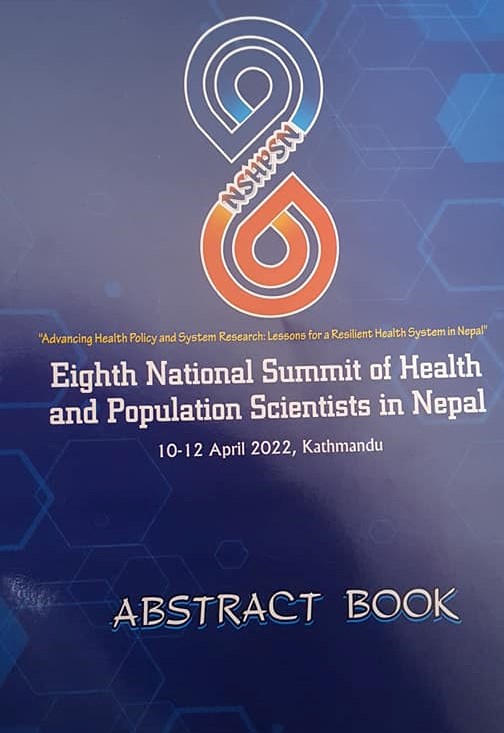 Today say the start of the Eight National Summit of Health & Population Scientists in Nepal. Bournemouth University is involved in two presentation. The first will be one by University of Huddersfield PhD student Tamang Pasang, and her supervisors Prof. Padam Simkhada (FHSS Visiting Faculty), Dr. Bibha Simkhada (former BU Lecturer in Nursing and current FHSS Visiting Faculty) and Prof. Edwin van Teijlingen. Pasang will be talking about her thesis fieldwork: ‘Impact of Federalisation in Maintaining Quality of Maternal and Neonatal Care in Nepalese Health System’.
Today say the start of the Eight National Summit of Health & Population Scientists in Nepal. Bournemouth University is involved in two presentation. The first will be one by University of Huddersfield PhD student Tamang Pasang, and her supervisors Prof. Padam Simkhada (FHSS Visiting Faculty), Dr. Bibha Simkhada (former BU Lecturer in Nursing and current FHSS Visiting Faculty) and Prof. Edwin van Teijlingen. Pasang will be talking about her thesis fieldwork: ‘Impact of Federalisation in Maintaining Quality of Maternal and Neonatal Care in Nepalese Health System’.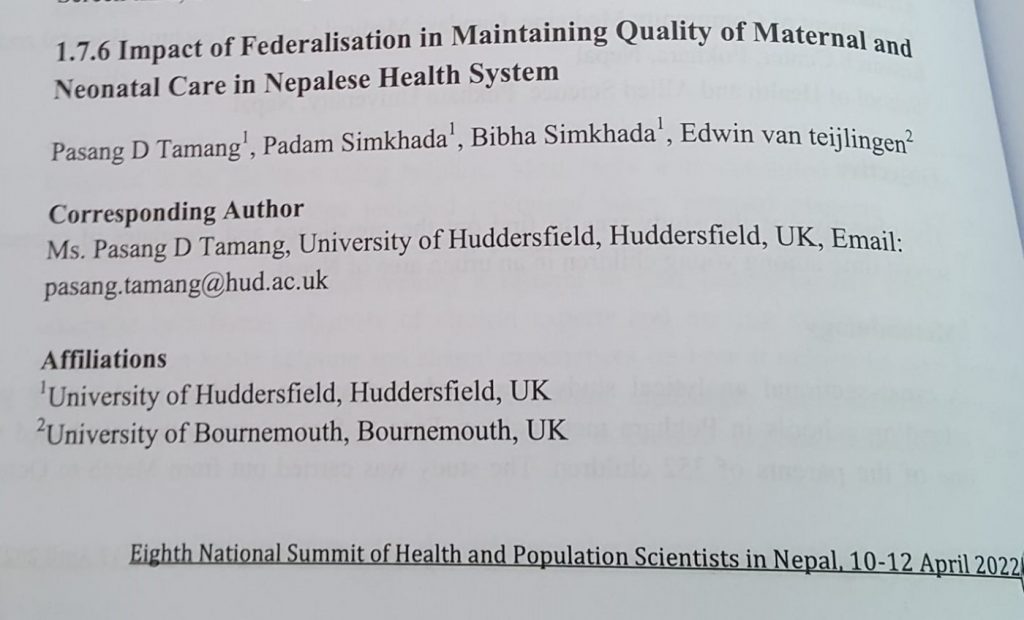
The second presentation will focus of the Nepal Federal Health System Project, our major collaborative project examining the consequences for the health system of Nepal’s move to a federal government structure in 2015. This is a joint project led by the University of Sheffield with Bournemouth University, the University of Huddersfield, and two institutions in Nepal: Manmohan Memorial Institute of Health Sciences MMIHS) and PHASE Nepal. This interdisciplinary study is funded by the UK Health Systems Research Initiative [Grant ref.
MR/T023554/1].
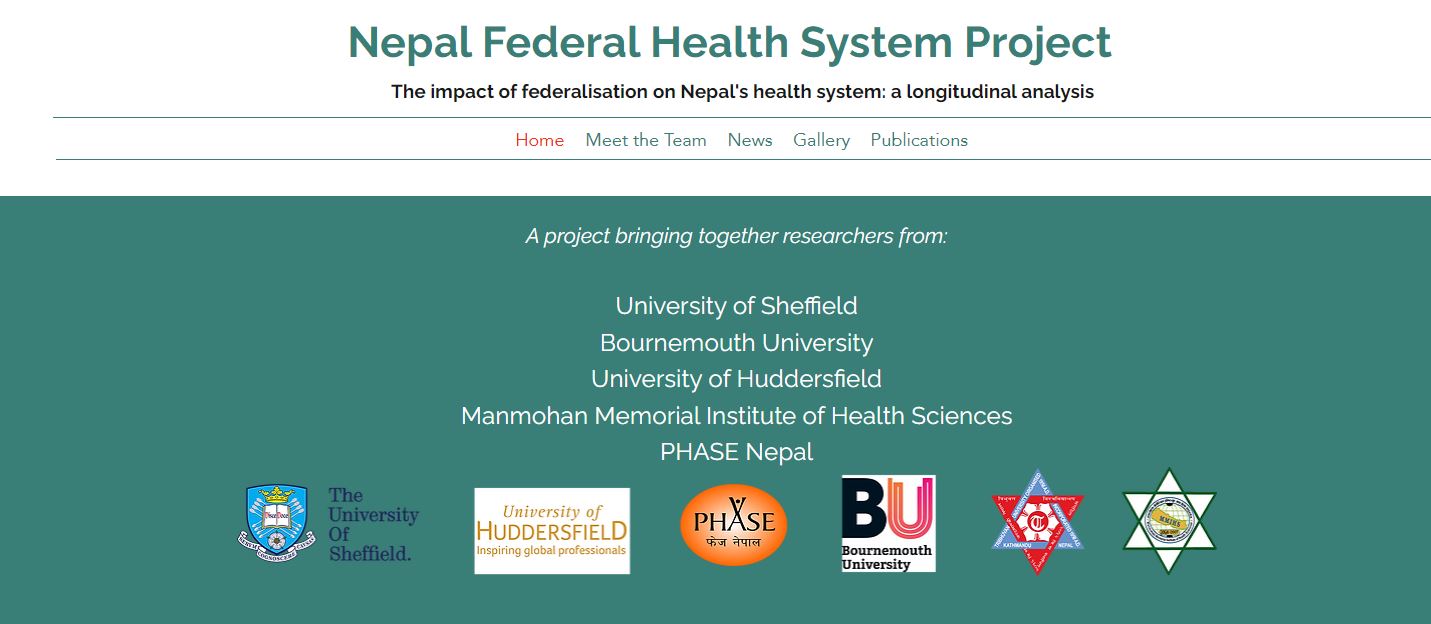
Prof. Edwin van Teijlingen
Centre for Midwifery, Maternity & Perinatal Health (CMMPH)
Nepal research published
 Yesterday saw the publication of a new scientific paper on the health care system in Nepal. The latest BU paper ‘Health facility preparedness of maternal and neonatal health services: A survey in Jumla, Nepal’ is a collaboration between academics at the University of Huddersfield, Liverpool John Moores University and the Centre for Midwifery, Maternal & Perinatal Health (CMMPH) at Bournemouth University [1]. This is the third paper led by Pasang Tamang, who is currently a PhD student at the University of Huddersfield [2-3].
Yesterday saw the publication of a new scientific paper on the health care system in Nepal. The latest BU paper ‘Health facility preparedness of maternal and neonatal health services: A survey in Jumla, Nepal’ is a collaboration between academics at the University of Huddersfield, Liverpool John Moores University and the Centre for Midwifery, Maternal & Perinatal Health (CMMPH) at Bournemouth University [1]. This is the third paper led by Pasang Tamang, who is currently a PhD student at the University of Huddersfield [2-3].
Prof. Edwin van Teijlingen
CMMPH
References
- Tamang, P., Simkhada, P., Bissell, P., van Teijlingen, E., Khatri, R., Stephenson, J., (2021) Health facility preparedness of maternal and neonatal health services: A survey in Jumla, Nepal, BMC Health Service Research 21:1023. https://rdcu.be/cyD01
- Tamang, P., Mahato, P., Simkhada P., Bissell, P., van Teijlingen, E. (2021) Pregnancy, Childbirth, Breastfeeding and Coronavirus Disease: What is known so far? Journal of Midwifery Association of Nepal (JMAN) 2(1): 96-101.
- Tamang, P., Mahato, P., van Teijlingen E, Simkhada, P. (2020) Pregnancy and COVID-19: Lessons so far, Healthy Newborn Network [14 April] healthynewbornnetwork.org/blog/pregnancy-and-covid-19-lessons-so-far/
2021: More COVID-19 publications
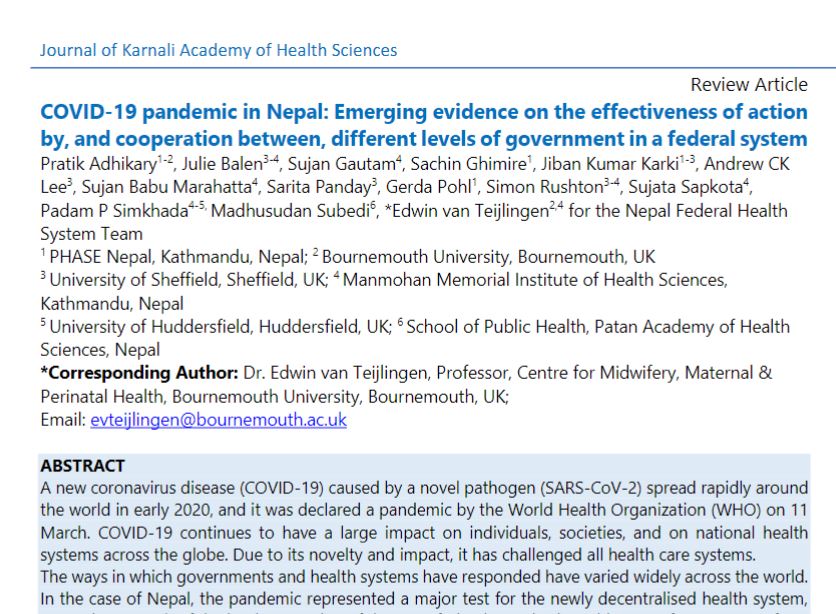 The year 2021 started in many ways in the same way as it had ended with a country gripped in COVID-19 and a national lock down to limit the spread of the disease. It is appropriate timely that the first publication from our international collaboration, studying the health system in Nepal, focuses on COVID-19 [1]. This academic paper forms part of our on-going study of the decentralisation of the Nepal health system. The study is run by the University of Sheffield, the University of Huddersfield and Bournemouth University in the UK and PHASE Nepal and Manmohan Memorial Institute of Health Sciences in Nepal. The study is funded by the UK Health Systems Research Initiative.
The year 2021 started in many ways in the same way as it had ended with a country gripped in COVID-19 and a national lock down to limit the spread of the disease. It is appropriate timely that the first publication from our international collaboration, studying the health system in Nepal, focuses on COVID-19 [1]. This academic paper forms part of our on-going study of the decentralisation of the Nepal health system. The study is run by the University of Sheffield, the University of Huddersfield and Bournemouth University in the UK and PHASE Nepal and Manmohan Memorial Institute of Health Sciences in Nepal. The study is funded by the UK Health Systems Research Initiative.
This paper was unplanned as nobody (neither in the UK or in Nepal) had heard of COVID-19 when we submitted the grant application in mid-2019. It was only when we started our project officially in April 2020 that COVID-19 had become the pandemic it is today. We took the opportunity to assess some of the early evidence on the effectiveness of the actions taken to deal with COVID-19 by the national government as well as provincial and local governments and the levels of cooperation and coordination between them.
Authors on this include BU PhD graduate Dr. Pratik Adhikary and FHSS Visiting Professor Padam Simkhada, as well as our collaborator on other funded projects, Dr. Sujan Marahatta from Manmohan Memorial Institute of Health Sciences (Nepal).
Prof. Edwin van Teijlingen
CMMPH
Reference:
- Adhikary P, Balen J, Gautam S, Ghimire S, Karki JK, Lee AC, Marahatta SB, Pandey S, Pohl G, Ruston S, Sapkota S, Simkhada PP, Subedi M, van Teijlingen ER, on behalf of the NFHS Team. The COVID-19 pandemic in Nepal: Emerging evidence on the effectiveness of action by, and cooperation between, different levels of government in a federal system. Journal of Karnali Academy of Health Sciences. 2020; 3(3)
FHSS PhD student’s poster at prestigious GLOW conference
Today and tomorrow Sulochana Dhakal-Rai will have her poster ‘Factors contributing to rising Caesarean Section rates in South Asia: a systematic review’ online at this year’s GLOW Conference [Global Women’s Research Society Conference]. This year for the first time, this international conference is held completely online. Sulochana’s PhD project is supervised by Dr. Pramod Regmi, P., Dr. Juliet Wood and Prof Edwin van Teijlingen at BU with Prof. Ganesh Dangal [Professor of Obstetrics and Gynaecology at Kathmandu Model Hospital] who acts as local supervisor in Nepal. Sulochana has already published two papers from her on-going thesis research [1-2].
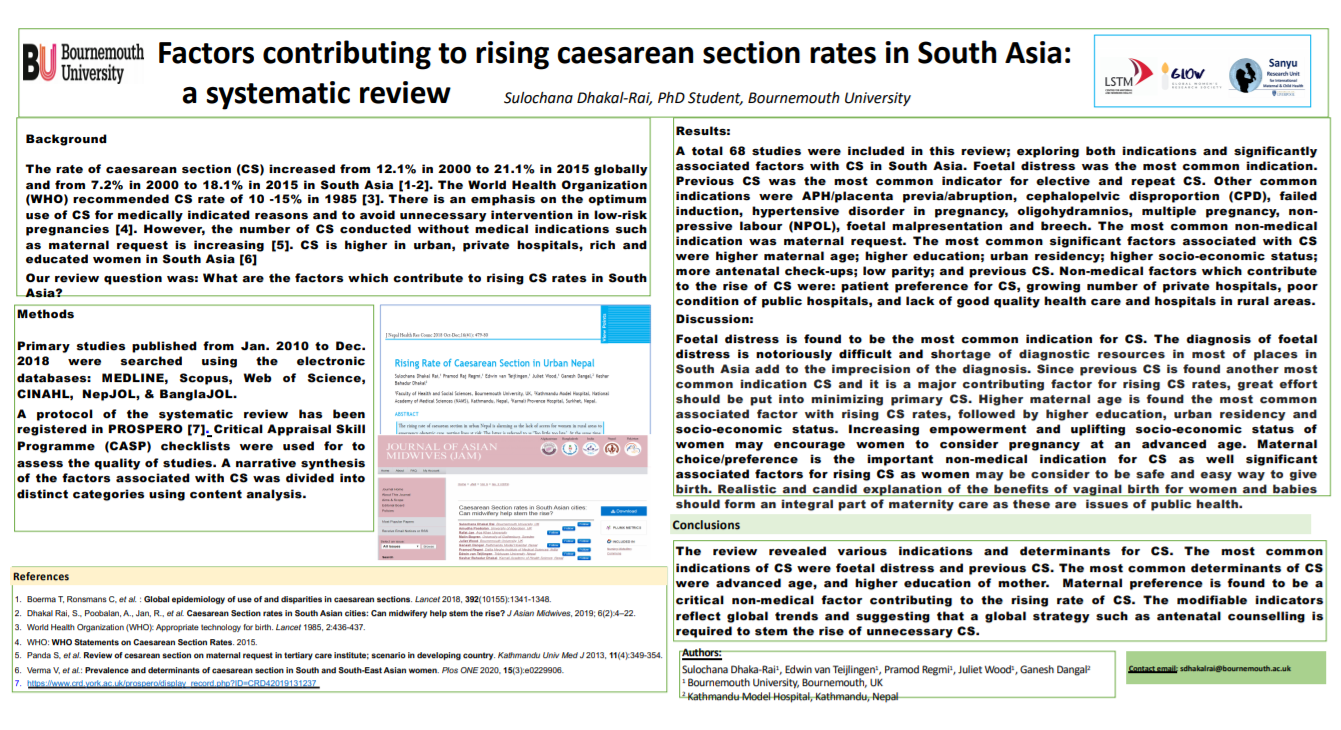
References
- Dhakal-Rai, S., Regmi, PR, van Teijlingen, E, Wood, J., Dangal G, Dhakal, KB. (2018) Rising Rate of Caesarean Section in Urban Nepal, Journal of Nepal Health Research Council 16(41): 479-80.
- Dhakal Rai, S., Poobalan, A., Jan, R., Bogren, M., Wood, J., Dangal, G., Regmi, P., van Teijlingen, E., Dhakal, K.B., Badar, S.J., Shahid, F. (2019) Caesarean Section rates in South Asian cities: Can midwifery help stem the rise? Journal of Asian Midwives, 6(2):4–22.
Building Strong Primary Health Care in Nepal
New BU co-authored article ‘Building Strong Primary Health Care to Tackle the Growing Burden of Non-Communicable Diseases in Nepal’ will be published soon [1]. This paper has been accepted by the international journal Global Health Action (published by Taylor & Francis). The international authorship comprises Nepal, Denmark and the UK.
Nepal is currently facing a double burden of non-communicable diseases (NCDs) and communicable diseases, with rising trends in the former. This situation will add great pressure to already fragile health systems and pose a major challenge to the country’s development unless urgent action is taken. The paper argues that while the primary health care approach offers a common platform to effectively address NCDs through preventive and curative interventions, its potential is not fully tapped in Nepal. In line with the Alma-Ata and Astana declarations, the authors propose an integrated approach for Nepal, and other low-and middle-income countries, including six key reforms to enhance the primary care response to the increasing burden of NCDs. These six key areas are: (1) Life-course approach to addressing NCDs; (2) Task shifting for NCD risk factor management; (3) Strengthening informal care givers; (4) Strengthening quality of PHC and health systems; (5) Establish strategic information management system; and (6) Healthcare financing.

Prof. Edwin van Teijlingen
CMMPH
Reference:
- Gyawali, B., Khanal, P., Mishra, S.R., van Teijlingen, E., Meyrowitsch, D.W. (2020) Building Strong Primary Health Care to Tackle the Growing Burden of Non-Communicable Diseases in Nepal, Global Health Action (accepted) https://doi.org/10.1080/16549716.2020.1788262
Online COVID-19 Conference Assam, India
Updated message (8 July 2020): due to floods in Assam this week this international conference has been postponed by a few weeks.
If you are interested in a more global perspective of COVID-19 you may want to attend the upcoming Online International Conference “COVID-19: A Global Perspective” to be held from 29 to 31 July, 2020 by the PG Department of Economics, Gossaigaon College, Gauhati University, Assam, INDIA. BU will be contributing to the sub-theme COVID-19 and its impact on the health sector.

Professor Edwin van Teijlingen
CMMPH
 Last month we reported on this Bournemouth University Research Blog (click here!) that Ms. Amshu Dhakal, presented findings from our Nepal Federal Health System Project in Nepal. Amshu’s presentation at the Nepal Health Conclave 2024, organised by the Ministry of Health and Population and supported by WHO (World Health Organization) Nepal and UNFPA, resulted in an online article in Nepal. This article in Nepali in Swasthya Khabar Patrika features lessons learnt and evidence from our research project “The Impact of Federalisation on the Health System of Nepal.”
Last month we reported on this Bournemouth University Research Blog (click here!) that Ms. Amshu Dhakal, presented findings from our Nepal Federal Health System Project in Nepal. Amshu’s presentation at the Nepal Health Conclave 2024, organised by the Ministry of Health and Population and supported by WHO (World Health Organization) Nepal and UNFPA, resulted in an online article in Nepal. This article in Nepali in Swasthya Khabar Patrika features lessons learnt and evidence from our research project “The Impact of Federalisation on the Health System of Nepal.”
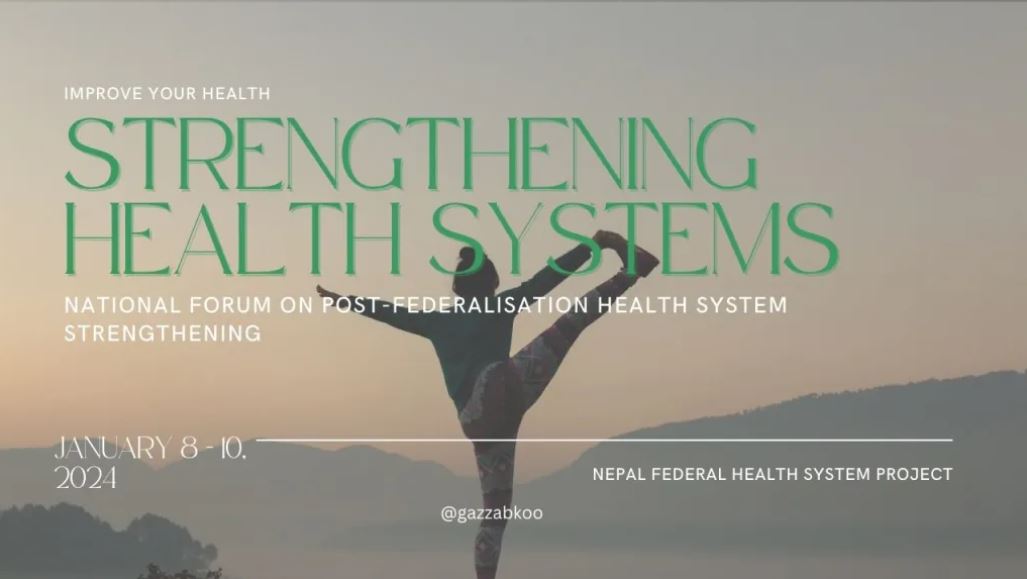 This is one of several news articles from this project which have appeared in both English and Nepali in national media in Nepal.
This is one of several news articles from this project which have appeared in both English and Nepali in national media in Nepal. 










 BU attendance at third annual GCPHR meeting in June
BU attendance at third annual GCPHR meeting in June Interactive Tangible and Intangible Heritage Applications – BU student work featured in new book chapter
Interactive Tangible and Intangible Heritage Applications – BU student work featured in new book chapter Second NIHR MIHERC meeting in Bournemouth this week
Second NIHR MIHERC meeting in Bournemouth this week MSCA Postdoctoral Fellowships 2025 Call
MSCA Postdoctoral Fellowships 2025 Call ERC Advanced Grant 2025 Webinar
ERC Advanced Grant 2025 Webinar Horizon Europe Work Programme 2025 Published
Horizon Europe Work Programme 2025 Published Horizon Europe 2025 Work Programme pre-Published
Horizon Europe 2025 Work Programme pre-Published Update on UKRO services
Update on UKRO services European research project exploring use of ‘virtual twins’ to better manage metabolic associated fatty liver disease
European research project exploring use of ‘virtual twins’ to better manage metabolic associated fatty liver disease